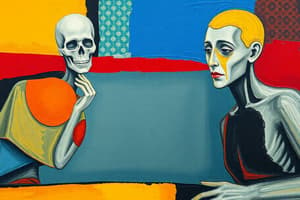Podcast
Questions and Answers
What is one way therapists are typically used in film?
What is one way therapists are typically used in film?
- To promote ethical therapeutic practices
- To encourage audiences to seek therapy
- To provide a detailed and accurate representation of psychoanalysis
- To serve as comic relief, skeptics, or rational foils to supernatural events (correct)
Psychoanalytic film criticism focuses solely on analyzing characters as if they were real people.
Psychoanalytic film criticism focuses solely on analyzing characters as if they were real people.
False (B)
What is the 'Cathartic Cure' myth as portrayed in films?
What is the 'Cathartic Cure' myth as portrayed in films?
The idea that a single repressed memory and emotional release can lead to instant healing.
Films often freeze Freud in ______ mode, even though real psychoanalysis has moved on.
Films often freeze Freud in ______ mode, even though real psychoanalysis has moved on.
Match the following descriptions with the correct terms:
Match the following descriptions with the correct terms:
How do romantic comedies and musicals typically utilize therapy?
How do romantic comedies and musicals typically utilize therapy?
The text suggests that female therapists in film are rarely depicted crossing boundaries by falling in love with male patients.
The text suggests that female therapists in film are rarely depicted crossing boundaries by falling in love with male patients.
What is one example of a cinematic term that has been borrowed in real therapy?
What is one example of a cinematic term that has been borrowed in real therapy?
In psychoanalytic film criticism, analyzing what values or beliefs a film portrays relates to examining its ______.
In psychoanalytic film criticism, analyzing what values or beliefs a film portrays relates to examining its ______.
Match the film criticism with the concept:
Match the film criticism with the concept:
What marked the Golden Era of therapists in the media?
What marked the Golden Era of therapists in the media?
Therapists are always portrayed as wise and helpful in films.
Therapists are always portrayed as wise and helpful in films.
What Freudian concept is often portrayed as an instant emotional cure in films?
What Freudian concept is often portrayed as an instant emotional cure in films?
In romantic comedies and musicals, therapy scenes are there to support ______.
In romantic comedies and musicals, therapy scenes are there to support ______.
Match the director with the concept:
Match the director with the concept:
What is a 'foil' as it relates to therapists in film?
What is a 'foil' as it relates to therapists in film?
The accuracy of therapy portrayal in films is prioritized over the needs of the genre.
The accuracy of therapy portrayal in films is prioritized over the needs of the genre.
In the late 20th century, how did Woody Allen and/or Hollywood portray therapists in movies?
In the late 20th century, how did Woody Allen and/or Hollywood portray therapists in movies?
Early filmmakers noticed that film feels ______ (images, symbols, non-linear logic).
Early filmmakers noticed that film feels ______ (images, symbols, non-linear logic).
Match the term to the period
Match the term to the period
Flashcards
Psychoanalysis + Cinema
Psychoanalysis + Cinema
The intertwined history and influence between psychoanalysis and cinema.
Cinema and Psychoanalysis timeline
Cinema and Psychoanalysis timeline
Films began around the same time as Freud's psychoanalytic theories.
Therapists in Film
Therapists in Film
Revealing a character's emotions subtly through therapy sessions.
Therapist's Explanations
Therapist's Explanations
Signup and view all the flashcards
Therapists as Comic Relief
Therapists as Comic Relief
Signup and view all the flashcards
Genres and Psychoanalysis
Genres and Psychoanalysis
Signup and view all the flashcards
Cathartic Cure Myth
Cathartic Cure Myth
Signup and view all the flashcards
Golden Era Therapists
Golden Era Therapists
Signup and view all the flashcards
Post-1960s Therapists
Post-1960s Therapists
Signup and view all the flashcards
1990s Therapist Portrayals
1990s Therapist Portrayals
Signup and view all the flashcards
Female Therapists in Film
Female Therapists in Film
Signup and view all the flashcards
Cultural Mythology
Cultural Mythology
Signup and view all the flashcards
Filmmaker's Unconscious
Filmmaker's Unconscious
Signup and view all the flashcards
Developmental Crises
Developmental Crises
Signup and view all the flashcards
Films as Dreams
Films as Dreams
Signup and view all the flashcards
Spectatorship
Spectatorship
Signup and view all the flashcards
Character Analysis
Character Analysis
Signup and view all the flashcards
Pop Culture in Therapy
Pop Culture in Therapy
Signup and view all the flashcards
Patient Expectations
Patient Expectations
Signup and view all the flashcards
Horror and Sci-Fi
Horror and Sci-Fi
Signup and view all the flashcards
Study Notes
- Psychoanalysis and cinema have had a long and complex relationship, influencing each other significantly.
- Films often use therapists, dream logic, and unconscious drives to enhance storytelling.
Development of Cinema and Psychoanalysis
- Cinema emerged in the 1890s with the Lumière brothers, coinciding with Freud's "Studies on Hysteria" in 1895.
- Early filmmakers recognized the dream-like qualities of film, such as its use of images, symbols, and non-linear narrative structures.
- Hugo Münsterberg proposed in 1916 that film mirrors the workings of the human mind.
Therapists as Characters in Film
- Therapists are used to reveal characters' inner feelings, replacing the need for expository voiceovers.
- Therapists are often used to deliver comprehensive explanations at the end of thrillers, providing closure.
- They may serve as comic relief, skeptics, or rational foils to the supernatural.
- A foil is a character who contrasts with another to highlight differences, such as a rational therapist versus chaotic supernatural events.
The Use of Psychoanalysis as a Prop in Various Genres
- Genres often prioritize their conventions over realistic depictions of therapy.
- In romantic comedies and musicals, therapy serves the genre's needs rather than portraying genuine healing processes.
- "Lovesick" (1983) exemplifies this, where a therapist falls in love with a patient, violating ethical boundaries for comedic effect.
- The genre dictates how therapy is depicted on screen, not the realities of psychotherapy.
The Myth of the “Cathartic Cure”
- Obsolete idea that unearthing a repressed memory leads to instant healing.
- Films often portray psychoanalysis as stuck in Freud's early stages (circa 1895).
- Audiences are drawn to this concept because it offers dramatic, emotional resolution within a short time frame.
The Evolution of Therapists in Film
- Golden era (1957–1963) showed therapists as wise and healing figures (e.g., "Three Faces of Eve," "Splendor in the Grass").
- Post-1960s, psychoanalysis came to be seen as part of a rigid system ("One Flew Over the Cuckoo’s Nest").
- In the 1990s, portrayals shifted toward therapists being neurotic, unhelpful, or unethical (e.g., Woody Allen films).
Representation of Women Therapists
- Female therapists treating male patients are frequently depicted as falling in love and crossing professional boundaries.
- Examples: "Spellbound," "Prince of Tides," "Mr. Jones".
- Common trope that women therapists cannot resist attraction to their patients.
Psychoanalytic Film Criticism
- Scholars apply psychoanalysis to analyze films through different lenses:
- Cultural Mythology: Examining the values and beliefs a film portrays (e.g., therapy as a quick fix).
- Filmmaker’s Unconscious: Interpreting the film as a reflection of the director's personal struggles.
- Developmental Crises: Analyzing films for psychological growth themes (e.g., "Beauty and the Beast").
- Films as Dreams: Recognizing the use of symbols and displacement akin to dream analysis.
- Spectatorship (the gaze): Understanding how the viewer's desires and unconscious influence film interpretation.
- Character Analysis: Least favored among scholars, involves analyzing characters as if they were real people.
The Influence of Pop Culture and Therapy
- Real therapy has adopted cinematic terms such as "flashbacks".
- Patients' expectations of therapy are influenced by cinematic portrayals, including hypnosis, memory recovery, and catharsis.
- Psychoanalytic concepts are prevalent even in horror and science fiction (e.g., "Alien" and the Kleinian paranoid-schizoid position).
Studying That Suits You
Use AI to generate personalized quizzes and flashcards to suit your learning preferences.




